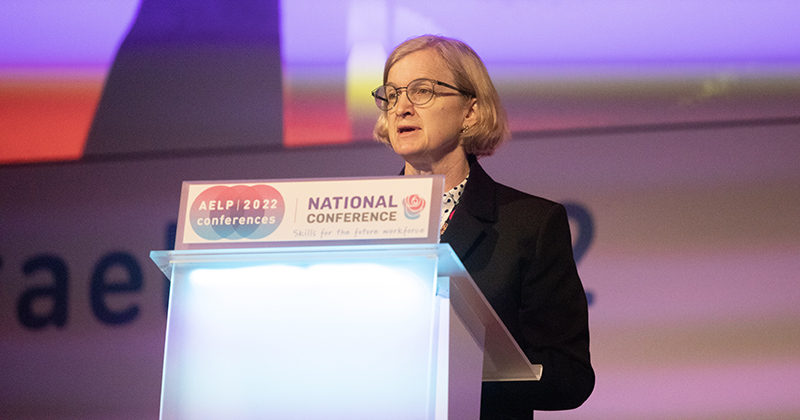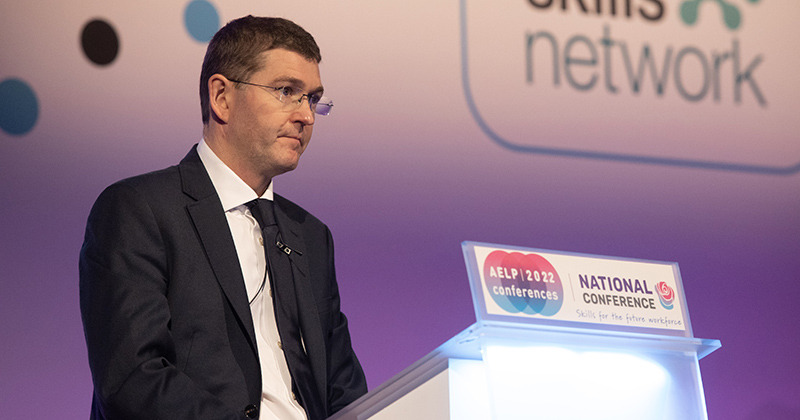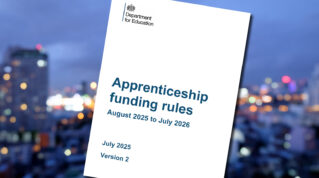Further education industry leaders and experts gathered in Hammersmith this week for the Association of Employment and Learning Providers’ (AELP) national conference.
Among the speakers were Ofsted’s chief inspector Amanda Spielman, who spoke about the impact the staffing crisis may have on quality of training, while Matthew Fell from the Confederation of British Industry outlined his wishes for apprenticeship levy review.
Elsewhere, Association of Colleges boss David Hughes spoke of the latest pay offer discussions with the University and College Union and what reclassification of college staff as public sector workers may mean.
In addition, Jennifer Coupland from the Institute for Apprenticeships and Technical Education updated the conference on the much-anticipated funding band review.
Here are the key takeaways from their speeches.
Ofsted: FE staffing crisis threatening quality of training
The FE staffing crisis is drawing leaders’ attention away from ensuring that quality education is delivered, Ofsted’s chief inspector has warned.
Amanda Spielman told conference this is a “significant concern” of hers, especially when it comes to specialist teachers and trainers in subjects like English and maths.
Both colleges and independent training providers recently told FE Week how soaring inflation and the cost-of-living crisis is forcing their staff to leave the profession in favour of better-paid jobs.
FE providers are also making parts of their workforce redundant in an effort to balance the books as funding rates continue at a level that does not reflect the true cost of delivery.

Spielman told AELP’s annual conference: “Of significant concern are the staffing difficulties that many of you are having, especially in relation to recruiting and retaining specialist teachers and trainers, including in subjects like English and maths. We are also seeing fewer learners achieving revised functional skills qualifications.
“These and other matters are absorbing leaders’ time and drawing their attention and focus away from thinking longer term about the learner experience.”
She also used her speech to take aim at apprenticeship achievement and retention rates, warning that they could “diminish the prestige and brand” of apprenticeships.
“Some achievement rates are very low, on one apprenticeship standard as low as 16 per cent,” Spielman said.
“We often find that the apprentices who finish the course and take their end-point assessment do very well. But too often, too many leave before the end of their training.
“But why is this? It could be down to money, because in the current labour market, you may not need an apprenticeship to earn more. But it could be because of pressures at work that mean apprentices do not get enough learning opportunities. Or it could be because of poor quality provision.”
She continued: “Now, more than ever the answer to the why question is so important. Are apprentices going into better-paid roles in entirely different sectors? Are they getting new roles, thanks to their learning, for better pay, but ending their apprenticeships early? These may be great outcomes for apprentices, but what about the wider picture?
“There is a real danger that poor retention rates, low achievement rates and a lack of information to demonstrate the value of training programmes will undermine the value of apprenticeships and diminish the prestige of the brand.”
CBI: ‘Let’s unlock levy money that isn’t being used too productively’
The apprenticeship levy should only be reformed for sectors where it is being under-utilised, according to the Confederation of British Industry.
Chief policy director Matthew Fell from the CBI told conference that the employer representative body had “got a little bit of traction” from the Treasury, after chancellor Rishi Sunak said the levy would be examined alongside other elements of the tax system in his spring statement.
“We said to the Treasury that we think there’s a way of getting better bang for the buck out of this,” Fell said.
“Keep it as it is today for firms that it’s working brilliantly for, but then let’s unlock that money that isn’t being used as productively in some other firms and some other sectors for the skills that they need.”
Fell said it was “not a slam dunk” it would happen but believed there is interest in introducing flexibility to certain sectors.
The CBI would like to see the levy element ringfenced but able to be used for more flexible training, he explained.
“Some people might say, actually, I really like that to be spent on apprenticeships just as I’m using today, because it’s working fantastically,” he said. “Others would say, actually, you know what, I can only really utilise 30, 40, 50 per cent of that on an apprenticeship route, but I have some other really burning issue skills needs over here.”

Fell said firms “should be stepping up and spending a lot more on training” but it was a difficult ask when the existing levy was under-utilised.
In addition, he told the conference that apprenticeships were best for getting people into work for the first time, but bitesize training was more suitable for existing workers needing training.
He said: “If you’re already in the world of work, there are elements of it that I don’t need to relearn ̶ how do I properly behave and treat myself, handle myself in the world of work?
“But what I’d absolutely need is then some of the skill elements of the apprenticeship to learn a new craft.
“If I’m in automotive, for example, and I spent the last decade or more learning how to build combustion engines and that’s what I do, how do I flip that across to electric vehicles?”
He added: “Taking the best bits of the apprenticeship levy and making it available to existing workers in a digestible format, as well as those people into the world of work ̶ if we can crack both of those things we think we can be on to something.”
AoC: Consultants will be the big winners from college reclassification
Consultants and auditors are set to cash in on any reclassification of colleges as public sector institutions in the future, the Association of Colleges boss has warned.
David Hughes told conference that the financial side will be among the biggest change in the sector if Office for National Statistics proposals to reclassify colleges as public instead of private organisations goes through.
“The biggest implication is around the college accounts that become public accounts. So DfE will have all the college accounts on its balance sheet,” he said.
“Anyone who’s got shares in an auditing or accountancy firm, you’re going to make loads of money because there’s just going to be loads of business for consultants working out how to make this work.”
He refused to be drawn on whether he supported any change in classification, but said there may be a risk of more interference.
Elsewhere, Hughes said VAT could be affected, while capital borrowing procedures may also change as they will be carried out through local government, rather than commercial means.
He added: “We’re pushing really hard, as you would expect, to get the National Insurance one per cent pay for colleges, because it was paid for all public sector. So if colleges become public sector in September, we’ll say, ‘Well, where’s the one per cent bit of extra money?’”

Hughes also spoke about the AoC’s latest 2.5 per cent pay offer to the University and College Union, which the UCU rejected last week. He admitted fewer colleges than usual may be in a position to accept the offer.
“Colleges don’t have to adhere to the pay award we recommend ̶ it is a recommendation,” he said. “Usually about two-thirds of colleges either made the recommendation or exceed it. I think that’s probably going to be slightly less this year, but I think more than half will.”
Hughes said pay in the sector isn’t good enough, with the combination of bills like gas and electricity rising, inflation hitting nine per cent and only “modest” increases in funding creating a “perfect storm”.
He added: “I think it’s going to be really tough. But what we all have to do as employers is just make our institutions or organisations more attractive to the people that are out there with more choice. So, holiday pay, CPD training, progression opportunities, flexible working ̶ all of those things become much, much more important.”
IfATE: ‘We’re not in a position to give everyone a funding band lift overnight’
The outcome of the apprenticeships funding rate review will not be published until February 2023 at the earliest, the Institute for Apprenticeships and Technical Education has said.
And there will be no immediate changes to existing funding bands for apprenticeship standards upon conclusion of the review.
IfATE chief executive Jennifer Coupland was pressed for an update on the review during this week’s AELP conference. She explained that a pilot of the new funding model, which has been designed to better reflect the “true cost of delivery”, is ongoing.
Coupland said she understood the sector’s concerns about how skyrocketing inflation is resulting in higher costs for apprenticeship training delivery, but warned that the institute is “not in a position to give everyone a funding band lift overnight”.
She did not say when the IfATE would publish the final outcome of the review, but a spokesperson for the institute told FE Week it won’t be until the 12-month pilot, which started in January 2022, is complete.
The review will take into account the Department for Education’s eligible costs review, which is due for publication “shortly”, according to a document published in May alongside the draft apprenticeship funding rules for 2022/23.

There will not be an immediate change to existing funding bands for all apprenticeships following the conclusion of the pilot, the spokesperson said, although any funding band revisions will subsequently be managed through the new model.
Apprenticeship standards and their funding bands are reviewed periodically by IfATE, but may also need to be reviewed in other circumstances, such as lower than expected starts.
The institute’s revision process also allows trailblazers to request reviews of the apprenticeship funding bands after the apprenticeship has been approved for delivery for at least 12 months.
Coupland also used her conference speech to plug the IfATE’s plans to create a “fully integrated skills system” over the next five years.
She said there were over 14,000 different technical qualifications available last year, so it is “no wonder employers find it nigh on impossible to fathom which qualifications are any good”.
“Employers have been saying consistently and for so many years that the system is too complicated, they don’t understand it and it’s difficult for them to engage with,”, she added. “They’ve said that so much, so often, that it’s almost become the background music to the skills system.
“Educationalists sometimes try half-heartedly to justify it, but most of the time they just tune it out.”
Coupland continued: “But what if we actually started really listening to it – I mean really listening – and then acting on it?
“Working with you and employers, we plan to create a high-quality, streamlined system that employers can value and use easily.”

















Your thoughts